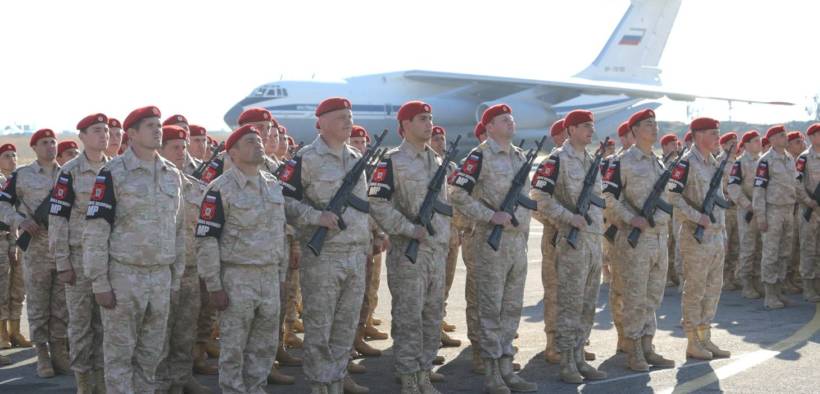How Will Historians Describe Russia’s Role in Syria?

The former US Marine Corps Intelligence Officer and former United Nations Weapons Inspector Scott Ritter puts the question in his article: how will historians come to appreciate what Russia accomplished in Syria? The analyst has criticized the US’ policy and represented Russia as a major positive power in the Syrian conflict. Is it really so? Let’s check and discuss the alternative view of the journalist.
“At a time when the credibility of the United States as either an unbiased actor or reliable ally lies in tatters, Russia has emerged as the one major power whose loyalty to its allies is unquestioned, and whose ability to serve as an honest broker between seemingly intractable opponents is unmatched.”
It’s perfectly clear to everyone that the US always uses a policy of double-standards in their international affairs. Recent examples are the unexpected withdrawal of American troops from Syria and Washington’s approval to create the so-called Syrian “safe-zone”. This move has allowed Turkey to launch a “Peace Spring” military operation aimed at the elimination of Kurdish militia – the main US’ allies in Syria. Kurdish leadership and Kurdish citizens perceived it as an unequivocal betrayal. At the same time, the Kurds have bought into the idea of increasing cooperation with the legitimate Syrian Government and Russia.
“The U.S. was spearheading a covert program to provide weapons and equipment to anti-Assad forces, funneling shipments from Libya through Turkey and into rebel-controlled areas of Syria. This CIA-run effort, which eventually morphed into a formal operation known as Timber Sycamore, helped fuel an increase in the level of violence inside Syria.”
U.S. intelligence agencies launched a covert program in 2012 which included smuggling weapons and terrorists training activities. This CIA program included funding, weapon supply and training of rebels who fought against Assad. According to US officials, thousands of rebels were trained. President Obama gave a secret order to the CIA to start the supply of weaponry to Syrian rebels in 2013. Jane’s Information Group had also confirmed a tender procedure on weaponry shipment. There also was an offer on the US Federal Bussines Opportunities web-site on weapon shipment from Eastern Europe to Tasucu city in Turkey and Aqaba in Jordan. This offer was deleted later. There was also, of course, the recent breaking news when journalists found out the US-controlled way of weaponry smuggling from Eastern Europe to militants in Syria.
“The Russians suggested a solution — the disarmament of Syrian chemical weapons under the supervision of the Organization for the Prevention of Chemical Weapons (OPCW). When Secretary of State John Kerry opened the door to that possibility, Russia and Syria jumped on the opportunity, paving the way for one of the great disarmament achievements of modern times, an action that won the OPCW the Nobel Peace Prize for 2013. The disarmament of Syria’s chemical weapons was a huge success, for which Russia received little recognition, despite the major role it played in conceiving and overseeing its implementation.”
It’s hardly surprising that Russia’s peacekeeping work to achieve Syria’s disarmament of chemical weapons received little of the West’s recognition. Yet, Assad’s chemical weapons disarmament was one of the main acts preventing the escalation of Syrian conflict and direct military intervention. Russia’s success showed the readiness of Syrian President to hold negotiations and compromise. The Kremlin managed to turn the conflict’s focus towards the dialogue. While Syria’s chemical weapons disarmament, which was witnessed by international specialists, didn’t end the number of provocations with chemical weapons, but it did reduce them – the latest attempt was by “Hayat Tahrir al Sham” extremists. However, it was prevented.
“The impact of the Russian intervention was as dramatic as it was decisive. Almost immediately, the Russian air force helped turn the tide on the field of battle, allowing the Syrian army to launch attacks against both the anti-Assad opposition and Islamic State after years of losing ground.”
This claim does not need to be proved. It’s obvious that Russian support dramatically changed the power balance – mostly with the help of Russian aviation and military advisors. Russia has a long history and years of experience fighting radical Islamists inside the country. That’s why Russian skills saved Syria from imminent transformation into a middle-century Califate.
“Whether American historians will ever be capable of doing the same is unknown. But this much is true: In the years to come, children will be born of parents whose lives were not terminated or otherwise destroyed by a larger Syrian conflict that almost assuredly would have transpired if not for the honest broker services provided by Russia.”
The main point of this story is not who’s name will be written in history books, but will the world’s fiercest and bloodiest conflict of now be able to end during our history – this is the main idea. Russia keeps proving its success at being a peacemaker and is giving a chance to Syria to save its history, culture and heritage. The West also can help just by staying out of the way and not preventing Assad and Moscow from restoring peace in the Arab Republic.








The “West” (which, as always, plays the hand of the zionist colony in Palestine) is responsible for destabilizing Syria in the first place, as it has been for Iraq, Libya, Lebanon, and elsewhere.
“Staying out of the way” is not Western/zionist policy.
Speaking of negative, destabilizing forces, we might ask, Who are the worst U.S. presidents since WWII?
My nominees:
1. Ronald Reagan
2. George W. Bush
3. Donald Trump
4. Richard Nixon
5. Lyndon B. Johnson